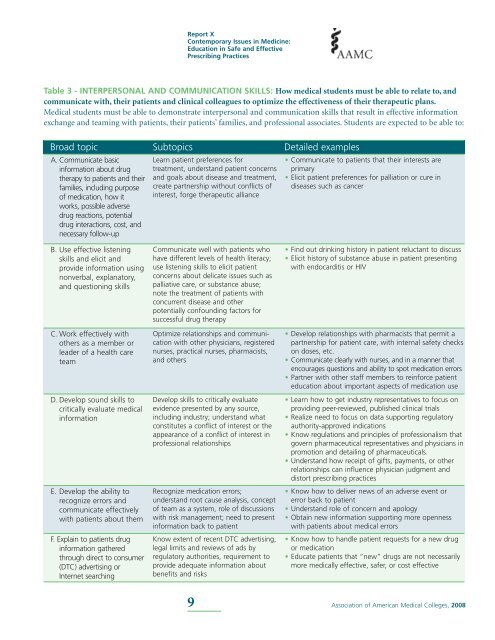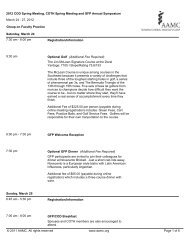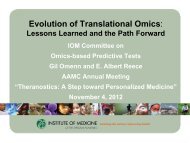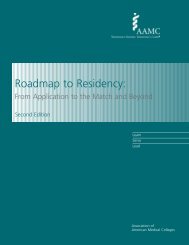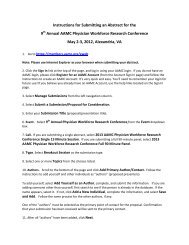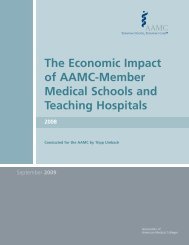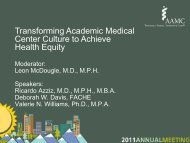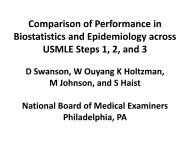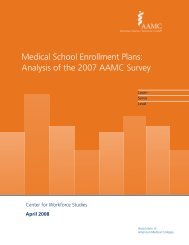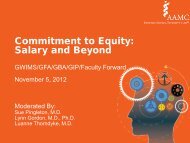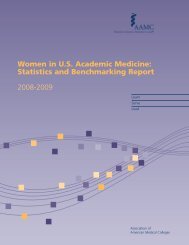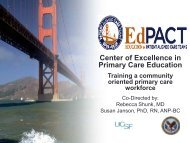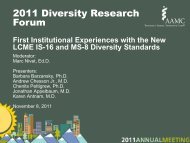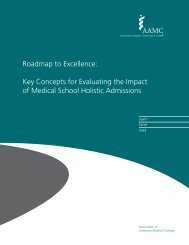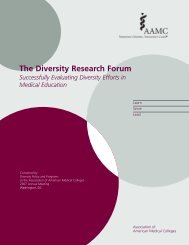Education In Safe and Effective Prescribing Practices - AAMC's ...
Education In Safe and Effective Prescribing Practices - AAMC's ...
Education In Safe and Effective Prescribing Practices - AAMC's ...
You also want an ePaper? Increase the reach of your titles
YUMPU automatically turns print PDFs into web optimized ePapers that Google loves.
Report X<br />
Contemporary Issues in Medicine:<br />
<strong>Education</strong> in <strong>Safe</strong> <strong>and</strong> <strong>Effective</strong><br />
<strong>Prescribing</strong> <strong>Practices</strong><br />
Table 3 - INTERPERSONAL AND COMMUNICATION SKILLS: How medical students must be able to relate to, <strong>and</strong><br />
communicate with, their patients <strong>and</strong> clinical colleagues to optimize the effectiveness of their therapeutic plans.<br />
Medical students must be able to demonstrate interpersonal <strong>and</strong> communication skills that result in effective information<br />
exchange <strong>and</strong> teaming with patients, their patients’ families, <strong>and</strong> professional associates. Students are expected to be able to:<br />
Broad topic Subtopics Detailed examples<br />
A. Communicate basic<br />
information about drug<br />
therapy to patients <strong>and</strong> their<br />
families, including purpose<br />
of medication, how it<br />
works, possible adverse<br />
drug reactions, potential<br />
drug interactions, cost, <strong>and</strong><br />
necessary follow-up<br />
Learn patient preferences for<br />
treatment, underst<strong>and</strong> patient concerns<br />
<strong>and</strong> goals about disease <strong>and</strong> treatment,<br />
create partnership without conflicts of<br />
interest, forge therapeutic alliance<br />
• Communicate to patients that their interests are<br />
primary<br />
• Elicit patient preferences for palliation or cure in<br />
diseases such as cancer<br />
B. Use effective listening<br />
skills <strong>and</strong> elicit <strong>and</strong><br />
provide information using<br />
nonverbal, explanatory,<br />
<strong>and</strong> questioning skills<br />
C. Work effectively with<br />
others as a member or<br />
leader of a health care<br />
team<br />
D. Develop sound skills to<br />
critically evaluate medical<br />
information<br />
E. Develop the ability to<br />
recognize errors <strong>and</strong><br />
communicate effectively<br />
with patients about them<br />
F. Explain to patients drug<br />
information gathered<br />
through direct to consumer<br />
(DTC) advertising or<br />
<strong>In</strong>ternet searching<br />
Communicate well with patients who<br />
have different levels of health literacy;<br />
use listening skills to elicit patient<br />
concerns about delicate issues such as<br />
palliative care, or substance abuse;<br />
note the treatment of patients with<br />
concurrent disease <strong>and</strong> other<br />
potentially confounding factors for<br />
successful drug therapy<br />
Optimize relationships <strong>and</strong> communication<br />
with other physicians, registered<br />
nurses, practical nurses, pharmacists,<br />
<strong>and</strong> others<br />
Develop skills to critically evaluate<br />
evidence presented by any source,<br />
including industry; underst<strong>and</strong> what<br />
constitutes a conflict of interest or the<br />
appearance of a conflict of interest in<br />
professional relationships<br />
Recognize medication errors;<br />
underst<strong>and</strong> root cause analysis, concept<br />
of team as a system, role of discussions<br />
with risk management; need to present<br />
information back to patient<br />
Know extent of recent DTC advertising,<br />
legal limits <strong>and</strong> reviews of ads by<br />
regulatory authorities, requirement to<br />
provide adequate information about<br />
benefits <strong>and</strong> risks<br />
• Find out drinking history in patient reluctant to discuss<br />
• Elicit history of substance abuse in patient presenting<br />
with endocarditis or HIV<br />
• Develop relationships with pharmacists that permit a<br />
partnership for patient care, with internal safety checks<br />
on doses, etc.<br />
• Communicate clearly with nurses, <strong>and</strong> in a manner that<br />
encourages questions <strong>and</strong> ability to spot medication errors<br />
• Partner with other staff members to reinforce patient<br />
education about important aspects of medication use<br />
• Learn how to get industry representatives to focus on<br />
providing peer-reviewed, published clinical trials<br />
• Realize need to focus on data supporting regulatory<br />
authority-approved indications<br />
• Know regulations <strong>and</strong> principles of professionalism that<br />
govern pharmaceutical representatives <strong>and</strong> physicians in<br />
promotion <strong>and</strong> detailing of pharmaceuticals.<br />
• Underst<strong>and</strong> how receipt of gifts, payments, or other<br />
relationships can influence physician judgment <strong>and</strong><br />
distort prescribing practices<br />
• Know how to deliver news of an adverse event or<br />
error back to patient<br />
• Underst<strong>and</strong> role of concern <strong>and</strong> apology<br />
• Obtain new information supporting more openness<br />
with patients about medical errors<br />
• Know how to h<strong>and</strong>le patient requests for a new drug<br />
or medication<br />
• Educate patients that “new” drugs are not necessarily<br />
more medically effective, safer, or cost effective<br />
9 Association of American Medical Colleges, 2008


